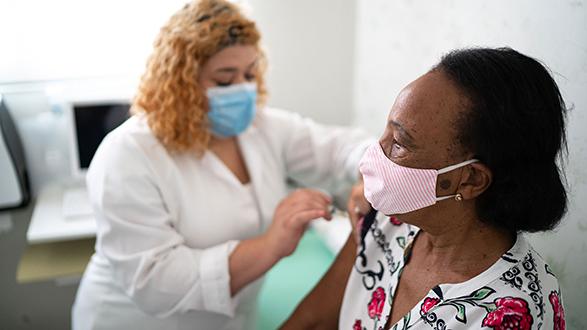
While a COVID-19 vaccine could be available in a matter of weeks, offering much-needed hope at the end of a grim and challenging year, a University of Maryland expert urges public health leaders and other authorities to begin communicating about the approval process and the vaccine’s safety and effectiveness right away.
Professor Sandra C. Quinn, chair of the Department of Family Science and a leading expert on vaccine acceptance and communication, writes in an editorial published in the American Journal of Public Health that transparency and clarity are critical to ensuring that the U.S. population accepts that the drugs—sped through development and likely heading for approval under emergency use authorization (EUA)—are safe and effective.
“Yet, we know from polls this year and from research during the H1N1 pandemic that there is significant skepticism of the EUA process and hesitancy to take a hypothetical vaccine approved this way,” said Quinn, who serves on the Maryland SARS-CoV-2 Vaccine Technical Advisory Group and other committees addressing the role of vaccines to fight the pandemic.
Vaccine development typically takes years, but scientists are racing to produce, test and distribute a safe and effective coronavirus vaccine on an unprecedented timeline. Yesterday, Pfizer submitted its application to the U.S. Food and Drug Administration for an EUA, and a decision is expected in mid-December. (Two other drug companies, Moderna and Astra-Zeneca are also reporting promising vaccines with more than 90% effectiveness and are expected to apply as well.)
The speeded-up process requires a commitment to transparency, particularly as new safety data emerge, an acknowledgment of uncertainty and that there may be changing guidance as new information is learned, and the use of clear, jargon-free language to explain the vaccine and ongoing monitoring, Quinn said.
“The EUA is meant to address a public health emergency for which there are not a lot of options,” she said. “We need to demystify the process and reassure people by saying that we’re not going to take the word of either the drug company or the president on whether this is safe. We have independent bodies reviewing all data from the trials, with careful examination of what data say about safety, and if it is not okay, they will not approve the vaccine.”
While this will be the first vaccine approved for the general public through the EUA process, several therapeutic drugs have been approved this way this year. Two drugs approved to treat COVID-19 had their approvals revoked, including hydroxychloroquine, a drug that President Donald Trump frequently touted despite a lack of evidence of its effectiveness. This recent history may lead people to call the EUA process into question, just as the use of the federal government’s name of “Operation Warp Speed” for the COVID-19 vaccine development process undermined trust, Quinn said.
Mistrust of experts and misinformation spread on social media could lead to too few people taking the vaccine for it to effectively protect the population. That mistrust of government and the medical profession is particularly prevalent in minority communities; only 14% of Black people and 34% of Latinx people trust that a vaccine will be safe, according to a survey released this week by the nonprofit COVID Collaborative. Given the disproportionate impact of the coronavirus pandemic in underserved communities, Quinn recommends early and ongoing efforts to reach these communities with culturally appropriate and targeted communication and outreach by trusted and influential people.
Seeing a national leader like Dr. Anthony Fauci, director of the National Institute of Allergy and Infectious Diseases, take the vaccine may make the difference for some. “But it might be a local pastor, the county council person that you like or a community health worker you know—there’s a role for a lot of different people to influence perception,” she said.
Using role models strategically is one of Quinn’s many recommendations for effective vaccine communication, but she’s also strongly advocating for the training of health care providers.
“Many don’t know about the vaccine trials and the EUA process,” she said. “They may think ‘How can I talk to my patient about this?’”
To get the communication right, Quinn recommends the creation of partnerships between local, state and federal public health agencies and community organizations, health care providers, faith communities, the media, the private sector, unions and civic associations. “It is really a shared responsibility, one organization cannot do this alone,” Quinn said.
She also urges ongoing monitoring of information communicated by the news media and on social media channels to guard against the spread of anti-vaccine misinformation that could erode trust.
“With the politicization of the pandemic, we are going to be swimming upstream on this. But with the devastation of the disease, it’s critical that we start communicating now.”
Related Links